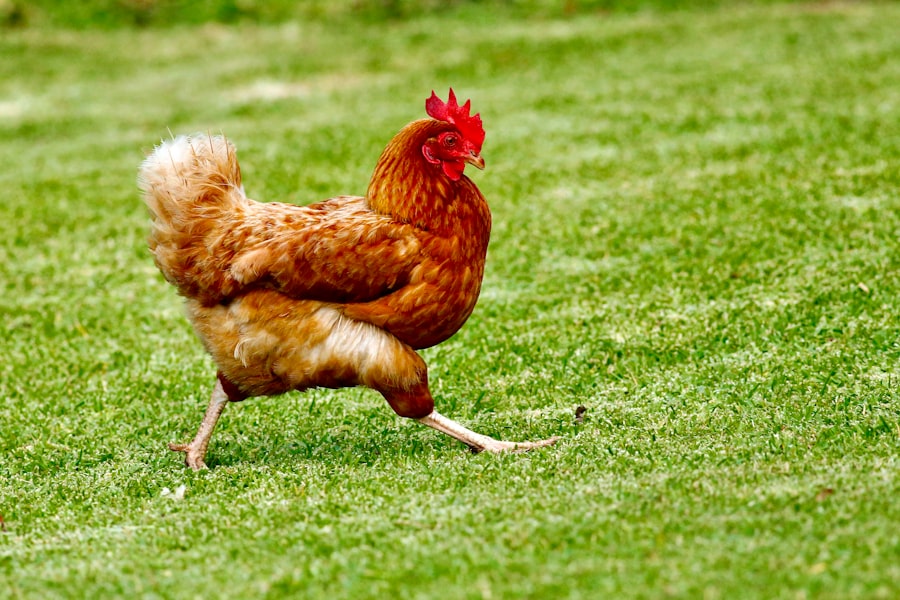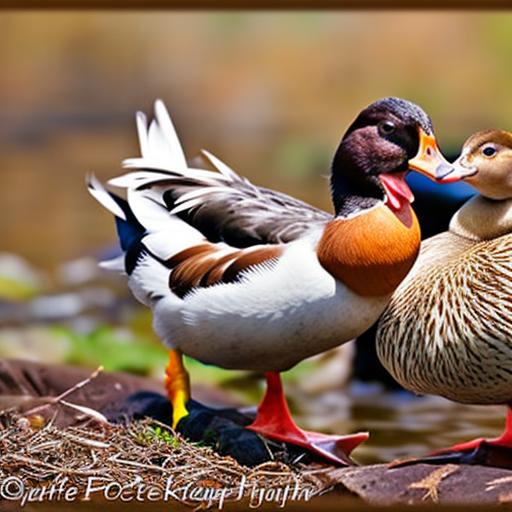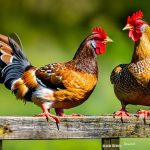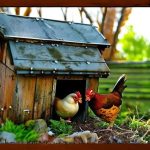Keeping ducks and chickens together in the same coop is a common question among backyard poultry keepers. While it is possible to keep these two species together, there are certain considerations that need to be taken into account. Ducks and chickens have different needs and behaviors, so it’s important to understand how they can coexist before making the decision to house them together.
Key Takeaways
- Ducks and chickens can be kept together in the same coop.
- Keeping ducks and chickens together can provide benefits such as pest control and socialization.
- Challenges of keeping ducks and chickens together include differences in behavior and dietary needs.
- Understanding the differences between ducks and chickens is important for successful cohabitation.
- Choosing the right breeds and designing a coop with separate living spaces can help maintain cleanliness and provide proper nutrition and water for both species.
The Benefits of Keeping Ducks and Chickens Together
There are several benefits to keeping ducks and chickens together in the same coop. One of the main benefits is increased socialization. Ducks and chickens are social animals and thrive when they have companionship. By keeping them together, they can interact with each other and form bonds, which can lead to happier and healthier birds.
Another benefit is pest control. Ducks are known for their love of eating insects, slugs, and snails. By keeping ducks and chickens together, you can create a natural pest control system in your backyard. Chickens will scratch the ground, exposing insects for the ducks to eat, while ducks will eat pests that chickens may not be interested in.
The Challenges of Keeping Ducks and Chickens Together
While there are benefits to keeping ducks and chickens together, there are also challenges that need to be addressed. One challenge is the difference in dietary needs. Ducks require more water than chickens and have different nutritional requirements. It’s important to provide separate feeders for each species to ensure they are getting the appropriate nutrition.
Another challenge is potential aggression between ducks and chickens. Ducks can be more aggressive than chickens, especially during mating season. They may chase or peck at chickens, which can cause stress or injury. It’s important to monitor their interactions closely and separate them if necessary.
To overcome these challenges, it’s important to provide enough space for both species. This will allow them to have their own areas to eat, drink, and rest without feeling crowded or threatened. Additionally, providing plenty of hiding spots and perches can help alleviate aggression by giving birds a place to escape to if needed.
Understanding the Differences Between Ducks and Chickens
Understanding the differences between ducks and chickens is crucial when considering keeping them together. Ducks are generally more active and require more space to roam and forage. They also have different behaviors, such as swimming and dabbling in water. Chickens, on the other hand, are more ground-dwelling and prefer to scratch and peck at the ground.
Physically, ducks have webbed feet and waterproof feathers, while chickens have claws and feathers that are not waterproof. Ducks also have a different way of drinking water, as they need to dip their bills in water and then lift their heads to swallow. Chickens, on the other hand, can drink from traditional waterers.
Understanding these differences can help with designing a coop that accommodates both species and meets their specific needs.
Choosing the Right Breeds of Ducks and Chickens to Keep Together
When keeping ducks and chickens together, it’s important to choose breeds that are known to get along well together. Some breeds of ducks and chickens are more compatible than others. For example, some duck breeds may be too large or aggressive for certain chicken breeds.
It’s recommended to choose smaller duck breeds that are known for their calm temperament, such as Call Ducks or Indian Runners. These breeds are less likely to cause harm or stress to chickens. When it comes to chickens, choosing docile breeds that can handle the presence of ducks is ideal. Breeds such as Silkies or Orpingtons are known for their calm nature.
Designing a Chicken Coop That Accommodates Both Ducks and Chickens

Designing a coop that accommodates both ducks and chickens requires careful planning. It’s important to provide enough space for both species to move around comfortably. Ducks require more space than chickens, so it’s recommended to have at least 4 square feet per duck and 2 square feet per chicken.
The coop should also have separate areas for feeding and drinking. Ducks need access to water for swimming and dipping their bills, so providing a shallow pool or pond within the coop is essential. Chickens, on the other hand, can drink from traditional waterers.
Additionally, providing plenty of hiding spots and perches can help alleviate aggression and provide a sense of security for both ducks and chickens.
Building a Coop with Separate Living Spaces for Ducks and Chickens
If you’re concerned about potential aggression or want to provide separate living spaces for ducks and chickens, building a coop with separate areas is an option. This can be done by dividing the coop into two sections, one for ducks and one for chickens.
Each section should have its own feeding and drinking areas, as well as enough space for the birds to move around comfortably. It’s important to ensure that each section has proper ventilation and lighting, as well as access to outdoor areas if possible.
Providing Proper Nutrition and Water for Both Ducks and Chickens
Providing proper nutrition and water is crucial when keeping ducks and chickens together. Ducks require more water than chickens, so it’s important to provide a shallow pool or pond within the coop for them to swim and dip their bills in. This will also help keep their feathers clean and healthy.
When it comes to feeding, ducks have different nutritional requirements than chickens. Ducks require a higher protein diet, especially during the breeding season. It’s important to provide separate feeders for each species to ensure they are getting the appropriate nutrition.
Maintaining Cleanliness in a Coop with Ducks and Chickens
Maintaining cleanliness in a coop with ducks and chickens is essential for their health and well-being. Ducks produce more waste than chickens, so it’s important to regularly clean and remove soiled bedding to prevent the buildup of ammonia and bacteria.
It’s also important to provide proper drainage in the coop to prevent water from pooling and causing dampness. Ducks need access to water for swimming, but it’s important to ensure that the coop remains dry and clean.
Regularly inspecting the coop for any signs of pests or disease is also important. Ducks and chickens can be susceptible to parasites and diseases, so it’s important to take preventative measures and seek veterinary care if needed.
The Pros and Cons of Keeping Ducks and Chickens Together in the Same Coop
In conclusion, keeping ducks and chickens together in the same coop can have its benefits and challenges. The benefits include increased socialization and pest control, while the challenges include different dietary needs and potential aggression.
By understanding the differences between ducks and chickens, choosing compatible breeds, designing a coop that accommodates both species, providing proper nutrition and water, and maintaining cleanliness, it is possible to successfully keep ducks and chickens together.
However, it’s important to weigh the pros and cons before making a decision. Every situation is unique, so it’s important to consider factors such as space availability, time commitment, and personal preferences before deciding whether to keep ducks and chickens together in the same coop.
If you’re considering keeping ducks and chickens together, it’s important to understand their unique needs and behaviors. One crucial aspect to consider is duck mating season, which can have an impact on the dynamics within the flock. To learn more about when duck mating season occurs and how it may affect your decision, check out this informative article on poultrywizard.com. Additionally, ensuring that your coop is suitable for both ducks and chickens is essential. Discover tips on creating a coop with appropriate nest boxes for your feathered friends in this helpful article: poultrywizard.com. For a convenient and secure coop option that accommodates both ducks and chickens, consider exploring the benefits of a snaplock chicken coop by visiting poultrywizard.com.
FAQs
Can I keep ducks and chickens together?
Yes, it is possible to keep ducks and chickens together in the same coop and run. However, there are some important considerations to keep in mind.
What are the benefits of keeping ducks and chickens together?
Keeping ducks and chickens together can provide several benefits, including increased pest control, improved soil health, and reduced feed costs. Ducks are excellent at controlling insects and slugs, while chickens are great at scratching and aerating the soil. Additionally, ducks can help reduce feed costs by foraging for their own food.
What are the challenges of keeping ducks and chickens together?
One of the main challenges of keeping ducks and chickens together is that they have different dietary needs. Ducks require more niacin and less protein than chickens, so it can be difficult to provide a balanced diet for both species. Additionally, ducks produce more water in their droppings than chickens, which can make the coop and run wet and muddy.
How can I ensure that my ducks and chickens get the right nutrition?
To ensure that your ducks and chickens get the right nutrition, you should provide separate feeders for each species. You can also supplement their diet with fresh greens and insects. Additionally, you may need to provide a niacin supplement for your ducks to ensure that they are getting enough of this important nutrient.
How can I prevent my coop and run from becoming wet and muddy?
To prevent your coop and run from becoming wet and muddy, you should provide plenty of bedding and ensure that the area is well-drained. You can also use a deep litter system, which involves adding layers of bedding and allowing it to compost over time. Additionally, you may need to provide additional ventilation to prevent moisture buildup.
Meet Walter, the feathered-friend fanatic of Florida! Nestled in the sunshine state, Walter struts through life with his feathered companions, clucking his way to happiness. With a coop that’s fancier than a five-star hotel, he’s the Don Juan of the chicken world. When he’s not teaching his hens to do the cha-cha, you’ll find him in a heated debate with his prized rooster, Sir Clucks-a-Lot. Walter’s poultry passion is no yolk; he’s the sunny-side-up guy you never knew you needed in your flock of friends!







